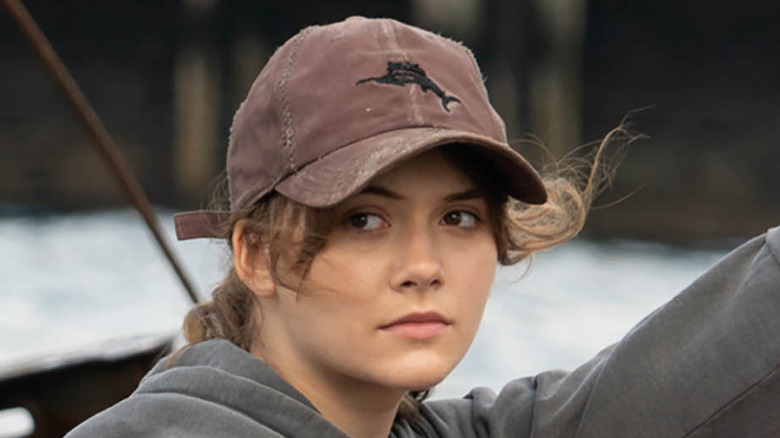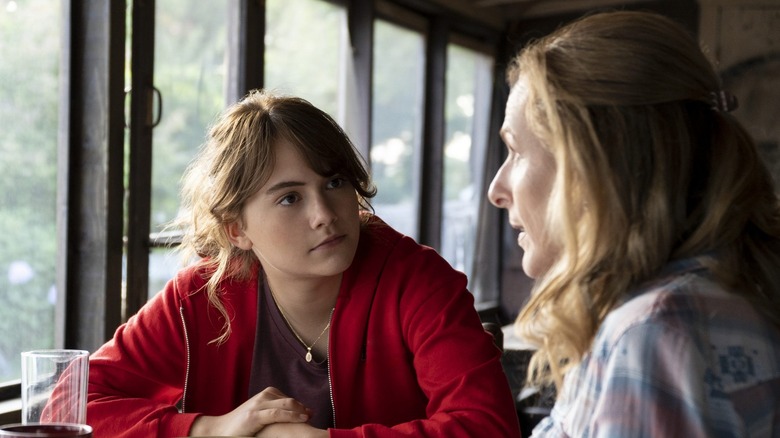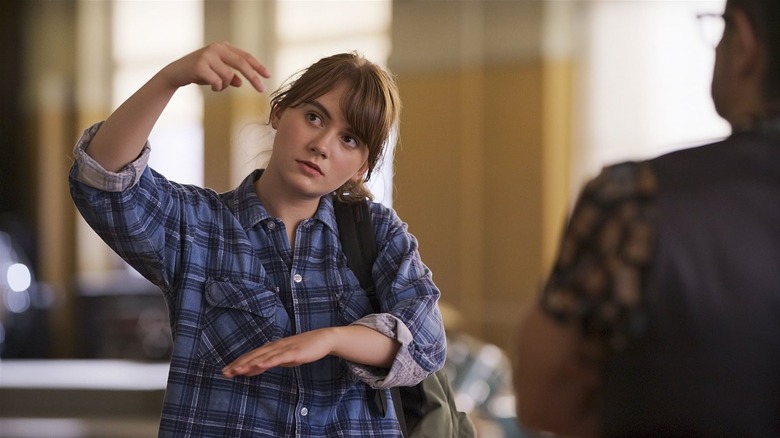CODA Review: 'Nuff Said
Every year at the Sundance Film Festival, there's a little indie that could, usually an Audience Award winner, that becomes a breakout simply for being the film with the most blatant upside for potential wider release. It's often the center of a bidding war from distributors. This competitive rat race to find the small film that will yield the biggest return has only gotten worse in the world of streaming giants, as this year, Apple of all companies broke records by spending $25 million to acquire "CODA," the new film from writer/director Sian Heder.
On the surface, and based on word of mouth alone, "CODA" seems like an obvious choice to join Apple's curious content portfolio. The film, an English-language remake of the French dramedy "La Famille Bélier," follows Ruby Rossi (Emilia Jones), a 17-year-old aspiring singer who must choose between following her dreams and sticking by her family, all deaf, who rely on her as an ASL interpreter and focal point of their fishing business. The tech giant's forays into film and television have largely played it safe, so setting a record for money spent on the festival market for a relatively safe, family-friendly bet like this is no surprise. Neither is them spending all that dough just to quietly drop it on their Apple TV+ service with little fanfare for the theatrical release.
But "CODA" stands out from other, similar feel-good content on the platform, like the Justin Timberlake vehicle "Palmer" or hit TV series "Ted Lasso," both for its genuine craft and its exemplary performances. It is a movie threatened to be undone by schmaltz and cliche at every corner, but it transcends its weepy tone through sheer force of will and the unique charm of presenting a deaf family without the self-defeating need to make them a monolithic model minority franchise.
All in the family
The Rossi family lives in Gloucester and runs a boat together, getting up at 3AM every day to fish, with Ruby having to negotiate selling the product for her father Frank (Troy Kotsur) and older brother Leo (Daniel Durant), all before her school day starts. Frank hates being taken advantage of and barely making enough to scrape by, just like the other fishermen having their profit margins squeezed by regulation and predatory business partners. But he sees being deaf as a significant barrier to being able to cut out the middleman and sell his own fish. Leo's a little more ambitious and a hothead. He knows this cycle isn't going to work forever, especially because he knows his sister has too big a gift to live the rest of her life as their free interpreting service.
Ruby is something of an odd duck at school, ostracized for being in an all-deaf family and for the inherent social awkwardness she possessed as a child coming from a home where no one else spoke. But she loves singing. It's her one escape from the Groundhog Day drudgery of living her life solely for helping keep her family afloat. Her mother Jackie (Marlee Matlin) discourages her musical aspirations, not just because she can't know if her daughter is even any good at such a crapshoot career goal, but because she's terrified of her baby abandoning the family for the hearing world. "If I was blind," Jackie asks her, "would you want to be a painter?"
These fears are exacerbated once Ruby's choir teacher Bernardo (Eugenio Derbez) starts tutoring her after school to audition at Berklee, causing Ruby's time to be split even further away from her duties on the boat. Close calls follow with the Coast Guard because she's not there to listen out for radio transmissions, or her zoning out while being expected to handle interpretation for a local news crew doing a story about the family's new fish market co-op. In typical teen movie melodrama fashion, she is somewhat artificially forced to choose between her status quo with her family and a new world where she follows her own goals.
The movie asks you to make some awkward leaps with regards to the logistics of the Rossi family's business and makes their willingness to exploit their daughter seem a little more pernicious than necessary solely for dramatic conflict. A tumultuous scene where Frank and Leo are fishing without Ruby while an overseer tips the Coast Guard off that they're violating all manner of rules by not having a hearing deck hand around is properly suspenseful, but makes Frank look like an idiot and a worse father than he truly is for literally never preparing for something like this. Sure, Ruby bails on them out of spite, but before this current conflict, she never took a sick day?
The family dysfunction side of the narrative works best when it mines comedy from how engrained Ruby must be in her family's lives, like in a scene where she has to interpret for a doctor explaining a sensitive health issue to her father and must be the bearer of bad news to the unusually horny couple that sex is off the table for the next few weeks. But tonally, exploring the thornier sides of this predicament is hit or miss, largely because the film doesn't have as much room to fully unpack the complex relationships each member in the family unit has with one another.
A handful of scenes brilliantly illustrate how far Frank would go to get outside of his own comfort zone if only his wife was less obsessed with the family keeping to themselves, or explore Leo's jealousy and frustration with the way Ruby is exalted within their clan, despite him being the older brother who should be counted on more. When "CODA" gets into those unfortunate truths and grittier confessionals, it comes alive. But those passages are often drowned out by Ruby's vocal training, repetitive scenes about mean girls from school, and the subplot romance between her and duet partner Miles (Ferdia Walsh-Peelo).
It's a shame in that this is the first time audiences are seeing Matlin, an Oscar winner, get to play a part with this much texture and diversion from the kind of parts she normally plays. We wouldn't want her to overshadow Ruby here, but the relationship between mother and daughter is one of the best in recent years, easily since Greta Gerwig's "Lady Bird" — and it would have been great to get more into it.
Express yourself
Movie cliches aside, "CODA" isn't special because of its plot, but the stirring way the story is told. There's a depth of expression here that is 100% a boon from the filmmakers, spurred by star and activist Matlin's insistence on hiring more deaf actors, allowing the film to be nearly half told in subtitled ASL. So much of the story relies on understanding the difference between the insular world Ruby's family has built for themselves, largely characterized by her mother's distaste for the hearing world, and that story wouldn't function nearly as well without being able to properly present the dichotomy between the way Ruby communicates at home and the way she communicates everywhere else.
Sometimes, movies that rely on a prominent character having a specific talent can be difficult to pull off. Movies about singing or stand-up comedy, for instance, don't work as well if the performer doing the singing doesn't have an undeniable voice, or if the comedian isn't universally assumed to be hilarious. Jones' singing voice as Ruby is solid, if unspectacular, but "CODA" doesn't frame her skill as the reason she should pursue her dreams, like she's somehow going to change the world by crooning. Rather, it puts the focus on how good singing makes her feel, and in turn, how that level of free expression makes those around her feel.
That distinction is more obvious because of how ASL looks when "spoken" onscreen. As a language, there's a musicality and a sense of performance to it, as anyone who has seen the viral video of an ASL interpreter performing "WAP" alongside Meg Thee Stallion at a festival can attest, that shows a fuller breadth of emotion. There's a memorable scene when Ruby's teacher tries to get her to explain how singing makes her feel. In that moment, actual words fail her, and she resorts to un-subtitled hand gestures that don't need to be translated or specified to mean any clear string of words. The hand movements and her facial expressions are enough to tell us what we need to know.
That moment is only bested later in the film, when Frank, in trying to better understand his daughter's gift for singing, zones out during a choir concert of hers, only to become more present when his eyes drift around at the rest of the audience, seeing the emotion her voice stirs in them. When they get home, he asks her to sing the song she sang that night again, just for him, spurring her to sing louder and louder, so he can press his hands around her neck and check and feel the vibrations in her voice.
It's one of the most affecting scenes this reviewer has seen all year, and it's those deeply moving moments that make "CODA" so easy to recommend. Overlooking or outright ignoring some of the film's goofier Hallmark drama isn't so hard when its heights so easily move you to tears.


